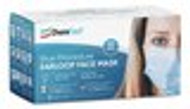Face Masks Help Keep Others Well
Posted by BK on 16th Jun 2020
The COVID-19 pandemic has affected the entire world, prompting public health officials to take massive action in order to keep citizens safe. From lockdowns and research to physical distancing and hand hygiene campaigns, life as we know it Canada looks different than it did just a few months ago.
One of the recommendations by Public Health Canada is the use of face coverings when it’s not possible to maintain a safe physical distance from others such as in shopping areas, public transportation, and other crowded public spaces. Face masks are used to contain the respiratory droplets people expel by breathing, talking, singing, coughing, or sneezing.
Since COVID-19 is primarily spread by these droplets, and because many people with COVID-19 are asymptomatic, the use of face masks helps to keep others well, which in turn reduces community spread.
Types of Face Coverings
Face masks come in three basic categories: cloth face masks, civil face masks, and medical grade face masks. Which is best? They all have their place. It depends on the situation. Let’s take a look.
-Cloth face masks — Made from fabric, cloth face masks are often homemade. They range from simple bandanas to loose- and form-fitting fabric face coverings with ear loops or ties. Some have pockets for inserting some sort of disposable filter like a paper towel or coffee filter. Cloth face masks can be washed and reused and are reasonably good at containing large respiratory droplets from the wearer. The quality of cloth face masks varies widely and is not regulated. If you do not have access to civil or medical-grade face masks, cloth face masks are better than nothing when out in public or around non-household members. Likewise, public officials urge the general public to use cloth face masks to ensure sufficient supplies of surgical and medical-grade face masks for those on the front lines of the pandemic.
-Civil face masks — The next step up are civil face masks. These are the disposable blue surgical masks healthcare workers often wear. Like cloth face masks, civil surgical face masks are designed to block the wearer’s respiratory droplets from spreading to others. They are lightweight and feature elastic ear loops. They often have a metal clip along the bridge of the nose to help form a tighter seal. However, civil face masks are worn loose. They are not airtight. Civil face masks are the preferred face masks for frontline workers such as healthcare workers, first responders, and grocery clerks.
-Medical-grade face masks— The most efficient face masks are medical-grade face masks also known as N95 and KN95 face masks. These are form-fitting face masks that form an airtight seal around the wearer’s mouth and nose. Not only do N95 and KN95 face masks block the wearer’s respiratory droplets, they filter out 95 percent of non-oil-based airborne particles. Medical-grade N95 and KN95 face masks also protect the wearer from breathing in fluids from others. Medical-grade face masks offer by far the best protection. Like civil surgical masks, medical-grade face masks are intended for one-time use and should be disposed of properly after use.
Early in the pandemic, civil and medical-grade face masks were in short supply. The PPE supply chain is recovering, and suppliers like DuraFast Label Company have inventory available for businesses in Canada. We have both civil and medical-grade face masks available. Whether you’re a healthcare provider, first responder, essential business, retailer, or anyone else concerned about limiting the spread of COVID-19 in public spaces, having a supply of disposable face masks is one of the best defenses. Do your part to keep others well.
